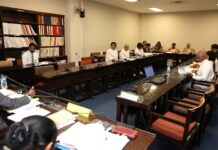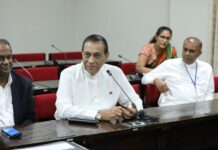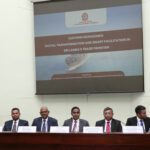Following the Easter Sunday attack, Sri Lanka continued efforts to enhance counterterrorism (CT) capacities and expanded its partnership with the United States to secure its maritime border, the United States Department of State said in the 2020 Country Reports on Terrorism released Thursday.
The State Department’s Country Reports on Terrorism 2020 on Sri Lanka said the government continued efforts improve border security, including through engagement with the United States and other international partners, though progress in some cooperative initiatives was stalled in light of the COVID-19 pandemic and parliamentary elections.
According to the report, the U.S. Department of Defense continues regular engagements with the Sri Lanka Navy Special Boat Squadron and Fast Attack Flotilla to enhance maritime security through the expansion of vessel board, search, and seizure capabilities.
The United States, the EU, the United Kingdom, Australia, Japan, and India have all pledged CT assistance to Sri Lanka, including through UNODC. Additionally, several other regional actors reportedly approached Sri Lanka on CT cooperation, including the PRC, Russia, and Pakistan.
The State Department Thursday released its annual Country Reports on Terrorism, detailing key developments in 2020 in the global fight against ISIS, Al-Qaida and other international terrorist groups.
The report’s Annex of Statistical Information shows that both the number of terrorist attacks and the overall number of fatalities resulting from those attacks increased by more than 10 percent in 2020 compared with 2019.
Overview: In the wake of the 2019 Easter Sunday suicide attacks by ISIS-inspired terrorists, Sri Lanka continued efforts to enhance its CT capacities and architecture and improve border security, including through engagement with the United States and other international partners, though progress in some cooperative initiatives was stalled in light of the COVID-19 pandemic and parliamentary elections. The government continued an inquiry into the failures to act on available intelligence and take other measures that might have prevented the 2019 attacks. Criminal investigations into the attacks continued, with more than 100 suspects remaining in custody, many of whom are detained under Sri Lanka’s Prevention of Terrorism Act (PTA). There have been no indictments to date. Human rights groups reported at least 22 PTA arrests were unrelated to the 2019 Easter Sunday attacks during 2020. Under the PTA, the ability to challenge detentions is limited.
While ISIS-inspired terrorists are considered the main terrorist threat in Sri Lanka, the government has expressed concerns about diaspora groups linked to the Liberation Tigers of Tamil Eelam (LTTE) – a designated Foreign Terrorist Organization that fought the government for 26 years until its military defeat in 2009 – trying to instigate violent extremist actions in Sri Lanka. Media and government officials reported on arrests of at least three LTTE-inspired or -linked Sri Lankan nationals found with explosive devices.
2020 Terrorist Incidents: There were no reported terrorist incidents in Sri Lanka in 2020.
Legislation, Law Enforcement, and Border Security: The Government of Sri Lanka continued to use the PTA, enacted in 1979 as a wartime measure, which enables the police to exercise broad powers to search, arrest, and detain terrorist suspects without charges. On the final day of 2019, following the election of President Gotabaya Rajapaksa the previous month, the government withdrew from Parliament the draft Counter-Terrorism Act, intended to repeal and replace the PTA, citing the views of various stakeholders and lack of consensus on the text.
The Sri Lanka Police, moved under the authority of the Ministry of Defense in 2020, includes the Counter-Terrorism Investigation Division, which sits under the Criminal Investigation Division, and the Special Task Force, a paramilitary unit specializing in CT and counterinsurgency operations. The government reactivated the mandate of the Chief of National Intelligence, who reports to the Secretary to the Ministry of Defense, as coordinator for all intelligence agencies to address gaps in information-sharing highlighted by the 2019 Easter Sunday terrorist attacks.
Sri Lanka made efforts to bolster border and maritime security. The government set up two special surveillance units at Colombo’s international airport, one to prescreen all electronic travel authorizations sent online by foreign nationals seeking entry visas, the other a plainclothes unit to observe passengers throughout the airport premises. The Sri Lanka Ports Authority was added as a member of the National Border Management Committee, which oversees all aspects of border management. In partnership with the International Organization for Migration, the government set up an integrated system for border management.
Sri Lanka conducted a national assessment to identify gaps in addressing the threat of IEDs in the areas of legislation, institutional arrangements, and investigative and forensic capacities.
Sri Lanka expanded its partnership with the United States to secure its maritime border. The U.S. Coast Guard, under the Department of State’s Export Control and Related Border Security program, continued to train Sri Lankan Coast Guard and Navy personnel on maritime law enforcement and security operations, and the Government of Sri Lanka continued to cooperate with U.S. Customs and Border Protection and the Department of Energy through the container security ‘Megaports Initiative’. The U.S. Department of Defense continues regular engagements with the Sri Lanka Navy Special Boat Squadron and Fast Attack Flotilla to enhance maritime security through the expansion of vessel board, search, and seizure capabilities.
Throughout the year, police investigated and arrested multiple individuals found with weapons and ammunition for alleged ties to the LTTE. These cases included an incident in which a former LTTE member sustained fatal injuries when an IED detonated while he was assembling it as part of an alleged plot to commemorate ‘Black Tiger Day’ on July 5 with bomb attacks. His common law wife was later arrested, and a cache of weapons was recovered from her home. In another case, a couple was apprehended on December 2 while transporting a claymore mine on a bus traveling from Jaffna to Kandy; additional weapons and ammunition were recovered from their home in connection with an alleged plot to carry out attacks in the North and East.
Sri Lanka Police continued to cooperate with the FBI on the ongoing investigation into the 2019 Easter attacks. Police made several additional arrests during the year under the PTA in connection with those attacks. At year’s end, more than 100 suspects related to these attacks remained in custody. Indictments remained pending at year’s end.
Countering the Financing of Terrorism, Sri Lanka belongs to APG, and the FIU of Sri Lanka is a member of the Egmont Group. In 2020 the government reviewed and updated its list of designated persons and entities under 2012 regulations, to implement UNSCR 1373, to include those related to the Easter Sunday attacks and others they identify as ‘Islamic extremists’. In 2020, Sri Lanka underwent its Mutual Evaluation report follow-up and was found to be either compliant or largely compliant in 31 out of 40 recommendations.
Countering Violent Extremism: The government collaborated with the multidonor Global Community Engagement and Resilience Fund to design an investment strategy for a pilot program on preventing violent extremism in the country, concentrating primarily on ethnic and religious tension. The program is set to launch in 2021 through the selection of small subgrants to local civil society organizations.
The government carried out a buy-back program in February as a measure to reduce the number of small arms and light weapons (SALW) in circulation. With UNODC assistance, the government is preparing a comprehensive SALW abatement plan.
International and Regional Cooperation: UNODC implemented projects on CVE and preventing violent extremism, including creating a regional network of CVE practitioners. The United States, the EU, the United Kingdom, Australia, Japan, and India have all pledged CT assistance, including through UNODC. Additionally, several other regional actors reportedly approached Sri Lanka on CT cooperation, including the PRC, Russia, and Pakistan. Sri Lanka is also a partner nation in the Global Initiative to Combat Nuclear Terrorism.











